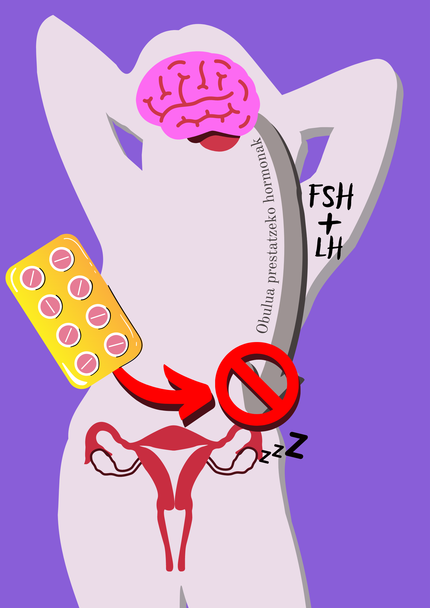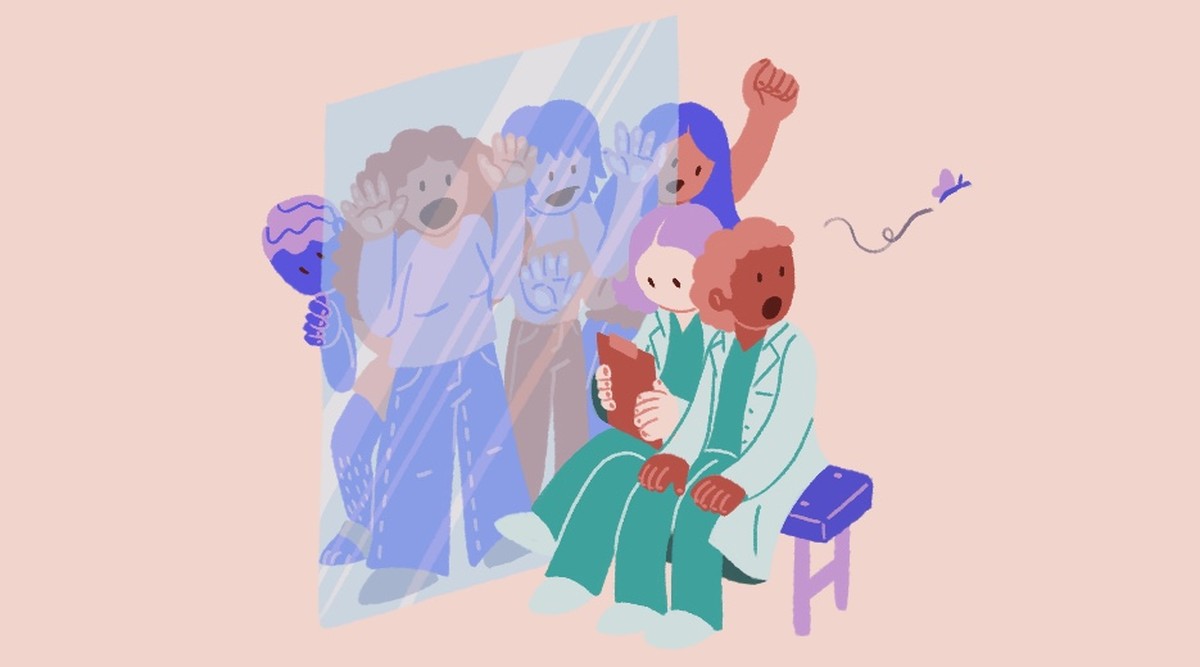The death of the female libido: the judicial period
CASE: What has happened?
She wants to have sex without risk of pregnancy, because this concern causes her discomfort. Your friends have recommended the use of oral contraceptives, so you have gone to the doctor and you have a box on your hands quickly.
The method of collecting it is simple, but you know that you will surely gain weight, your breasts will increase, you can suffer a mood change and, as a friend has told you, your cousin was depressed. You hope to avoid it, because everyone else, well... will have to accept it if you want to avoid the surprise of a baby.
Over time, you've noticed little of all the side effects that they told you. Lucky yours! But the truth is, you don't know what benefits the pills now bring you, because lately you're discouraged from having sex. Maybe it's stress, too much work, a few hours of sleep…
This situation is prolonged and becomes a concern. Libido seems so intimate, you don't know who to comment with. What is the simplest solution? [Internet].
Through the blogs of “women” you have found a phrase that has captured your attention: “Oral contraceptives can reduce libido.”
You've been running to that endless list of side effects of your pill usage page, SURPRISE! There it is written. Surprised, in your mind, how is it possible that something I take to enjoy unfettered sex will make my desire to have sex disappear?
DENOUNCED: What are oral contraceptives?

The oral contraceptive pathway started in 1960 and has become the second most used method of pregnancy prevention in Spain. In particular, the weight of activity is 18.5% of women, slightly increasing in proportion to their youth volume.
These miracle pills are based on two hormones called progestational hormones and estrogens, whose function is to avoid ovulation, since it is impossible to get pregnant without egg, because 2.
The mechanism is simple: each menstrual cycle prepares an egg to leave the ovary and move towards fertilization. All of this is controlled by FSH and LH hormones, and oral contraceptives block the secretion of both (Figure 2). Therefore, the ovaries fall asleep to prepare the eggs with a signal that will not come.
In addition, with the same objective, progestogen causes thickening of the cervical mucous membrane, which hinders the progression of sperm. So the eggs don't come out and the sperm don't come in.
DECEASED: [Libido]. What do we know about him?
The lexicon mentions libido as the psychic energy of the desire to have sex. Emotions are complex and sexual desire is no less. In fact, it influences other factors that move away from the biochemical level, such as content level, quality of life, fatigue, etc. 5.
However, biochemical studies show that dopamine is the main channeling hormone of libido. But the increase in dopamine also depends on other hormones, among which testosterone is the most interesting for us 6.
Testosterone is a hormone that is classified in the androgen group and, although generally considered a male hormone, it is also synthesized in the adrenal glands and the ovary. It is, therefore, a hormone that also appears in the women 7.
Conscious of this, testosterone and estradiol derived from its metabolism favor the increase of dopamine and, therefore, are reported to be related to increased libido.
To give an understandable example, ovulation occurs in the middle of the women's menstrual cycle, when the body is ready for fertilization. At this point, testosterone concentration increases enormously and, at the same time, libido increases to promote sex 7.
If we go to the opposite situation, some women notice a decrease in sexual passion after menopause and in them androgens (especially testosterone) and estrogens (other hormones from testosterone)8 are considerably reduced.
Therefore, it seems that by increasing testosterone concentration it also increases libido and decreases sexual desire.
MURDER: How do contraceptive methods influence libido?
As discussed above, oral contraceptives will sleep to the ovaries that are their victims to stop working for a while. According to studies, this situation reduces androgen and estrogen synthesis and, more specifically, decreases testosterone.
Moreover, testosterone may be associated with some proteins (albumin and sex? binding globuline) or free. What happens is that only this part that is free is useful, since while it is united there is no “bioavailable” (Figure 3) 7.

An increase in SHBG concentration has been observed when the estrogen used in the pills is metabolized in the liver, which reduces the percentage of directly free testosterone (Figure 3) 9.
So if whole free testosterone decreases when taking oral contraceptives and testosterone is related to libido, the articles will show a direct association between pills and libido restriction, right?
Well, no.
TRIAL
How is it possible that all paths lead to the same conclusion and that research results do not guarantee this link? Welcome to the world of science.
As already mentioned, sexual passion is an emotion that depends on many factors and, in the scientific world, the more variable the research theme has, the more difficult its analysis is.
Studies have shown an increase in libido as a result of taking pills. No biochemical arguments have been found to justify it and the reason is probably simpler than expected: the risk of an unwanted pregnancy generates a great concern in women, which can impair their passion for sexual relations. Thus, contraceptive methods confer control, which can lead to a feeling of greater tranquility and freedom and, consequently, libido 2.
Of course, we can also find other studies that say the opposite, which indicate a decrease in libido. Its main argument is based on the decline of free testosterone. Indeed, on the one hand, it is already accepted that the concentration of SHBG increases and that free testosterone is restricted to 9. On the other hand, women with libido problems benefit from testosterone and estrogenic hormones, such as li? 8. So it doesn't seem so crazy to think that the restriction of free testosterone that pills produce can affect libido.
Also, one of the effects of oral contraceptives is the thickening of the mucous membrane, which can cause problems of vaginal lubrication and drying. This causes painful and unpleasant sexual intercourse that indirectly can negatively affect sexual passion.
But why not all women?
People are not exact copies of each other and side effects may appear in each. However, the articles published to date reach the same conclusion: lack of research.
We cannot forget that this is a complex issue and that it is extremely difficult to analyze in isolation the influence of a single factor within an emotion that brings together several factors.
However, the experiences of women taking hormonal contraceptives are undeniable and there are people who suffer from this disease. The most acceptable argument to explain the event seems to focus on the sensitivity of each woman to testosterone 5,9. That is, the same decrease in free testosterone has a different effect on each woman, and a small percentage of them suffer a decrease in libido.
Are they then guilty of the murder of the libido? That may be the case, but more research is needed.
FINAL REFLECTIONS OF THE JURY
In this 60-year trajectory of oral contraceptive methods, besides offering women the possibility to control the risk of pregnancy, they have created the possibility of alleviating eleven more problems. In addition, hormone doses have been decreasing, resulting in a smaller side effect. In this respect, therefore, we can only welcome it.
But unfortunately, pills meet a socially taboo subject: sexual desire, or even the most hidden, female sexual desire. We must bear in mind that only 21% of women explain their sexual problems to the doctor. Similarly, doctors do not ask questions related to the sexual aspect or give no explanations if they prescribe treatment with oral contraceptive methods 10.
Sex is important for the well-being of people and the disappearance of libido can get rid of that well-being by the common. If this problem is not addressed by both doctors and patients, it is kept secret and, in the end, what does not appear in everyday life loses interest and reduces research possibilities.
The central reflection of this judgment is therefore summed up in the need for further research on the hidden issues related to women. It is unacceptable to consider lowering libido as a sustainable side effect and that medicine acts as if it did not exist. Information is power, both for science and for women's quality of life.
We will therefore be waiting for the contraceptive methods and libido of the mouth to be returned to court. Yes, while collecting data, do not hide the issues, ask the doctors, raise interest, worry about your sexual well-being. We may all be able to promote research on this subject.
BIBLIOGRAPHIC SOURCES
[1] SEC (2020). Spanish Contraception Survey 2020: - Sexual and Reproductive Health Observatory of the SEC. http://sec.es/\
[2] Burrows, L. J. Basha, M., & Goldstein, A. T. (2012) [The effects of hormonal contraceptives on female sexuality: a? .The journal of sexual medicine, 9(9), 2213-2223].
[3] Dragoman, M. V. (2014). The combined oral contraceptive pill-recent developments, risks and flash.Best practice & research Clinical obstetrics & gynaecology, 28(6), 825-834.
[4] Euskaltzaindia (2022). [Libido]. [Dictionary of Euskaltzaindia]. https://www.euskaltzaindia .eus/index.php?entry=libido&similar=ez&option=com_hiztegiansearch&view=frontpage&layout=advanced&itemid=410&lang=eu&bila=bai
[5] Pastor, Z., Holla, K., & Chmel, R. (2013) [The influence of combined oral contraceptives on female sexual desire: systematic a? .The European journal of contraception & reproductive health care, 18(1), 27-43].
[6] Clayton, A. H. (2010). The pathophysiology of hypoactive sexual desire disorder in women. International Journal of Gynecology & Obstetrics, 110(1), 7-11.
[7] Bianchi, V. E. Bresciani, E., Meanti, R., Rizzi, L., Omeljaniuk, R. J. & Seal, A. (2021). The role of androgens in women's health and well.Pharmacological Research, 171, 105758.
[8] Schaffir, J. (2006). [Hormonal contraception and sexual desire: a critical perspective. Journal of sex & marital therapy, 32(4), 305-314].
[9] Caruso, S., Palermo, G. Caruso, G. & Rapisarda, A. M. C. (2022). How Does Contraceptive Use Affect Women’s Sexuality? A Novel Look at Sexual Accepting. Journal of Clinical Medicine, 11(3), 810.
[10] Casado-Sword, N. M., de Alarcón, R., de la Nervión -Larrad, J. I, Profusa, B. & Montejo, Á. L. (2019) [Hormonal contraceptives, female sexual dysfunction, and managing strategies: a? .Journal of clinical medicine, 8(6), 908].
[11] Lee, J. J. M, Tan, T. C. & Ang, S. B. (2017). Female sexual dysfunction with combined oral contraceptive use.Singapore medical journal, 58(6), 285.



_article_big.jpg)



